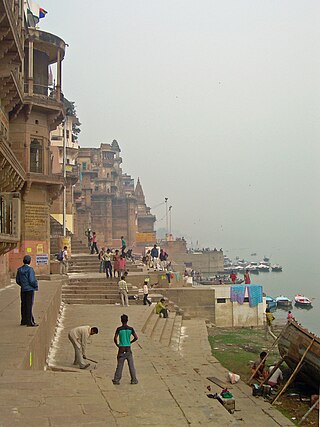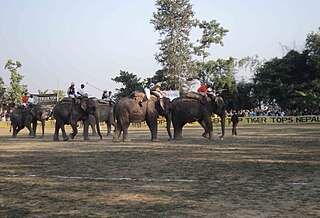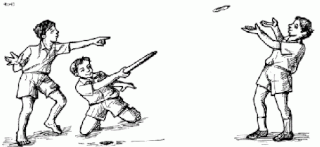
Kabaddi is a contact team sport played between two teams of seven players, originating in ancient India. The objective of the game is for a single player on offense, referred to as a "raider", to run into the opposing team's half of the court, touch out as many of their players as possible, and return to their own half of the court, all without being tackled by the defenders in 30 seconds. Points are scored for each player tagged by the raider, while the opposing team earns a point for stopping the raider. Players are taken out of the game if they are touched or tackled, but return to the game after each point scored by their team from a tag or tackle.

Gillidanda is an ancient sport originating from South Asia that is still widely played throughout South Asia. The sport is also found as far north as the Mediterranean and as far east as Southeast Asia. It was a precursor to cricket in South Asia.

Bagh-chal is a strategic, two-player board game that originated in Nepal. The game is asymmetric in that one player controls four tigers and the other player controls up to twenty goats. The tigers 'hunt' the goats while the goats attempt to block the tigers' movements. This game is also seen in southern India with a different board, but the rules are the same. This game is popular in rural areas of the country.

Elephant polo is a variant of polo played while riding elephants. It is played in Nepal, and Thailand. England and Scotland regularly field teams. Equipment consists of a standard polo ball and a 1.8 metres (5.9 ft) to 3 metres (9.8 ft) cane sticks with a polo mallet head on the end. The pitch is three-quarters of the length of a standard polo pitch, due to the lower speed of the elephants. Two people ride each elephant; the elephants are steered by mahouts, while the player tells the mahout which way to go and hits the ball.

Association football and basketball are the most popular sports in Asia. Cricket is the third most popular sport in Asia, and is most popular in South Asia. Other popular sports in Asia include baseball, badminton and table tennis among others. There are also some traditional sports that are popular in certain regions of Asia, such as the South Asian sports kabaddi and kho-kho, and sepak takraw in Southeast Asia. Top sporting nations/regions in Asia include China, Japan, South Korea, Taiwan, India, Iran, Kazakhstan and Uzbekistan.

Dandi biyo is a game played in Nepal which was considered the de facto national game until 23 May 2017, when volleyball was declared as the national sport. Dandi biyo is played with a stick (dandi) about 2 feet (61 cm) long and a wooden pin (biyo) about 6 inches (15 cm) long. The pin is a small wooden stick with pointed ends. The game is similar to the Indian game gilli danda. The government has not implemented any policies for the preservation of dandi biyo, and with decreasing players the game is expected to be extinct soon.
The lambs and tigers game, locally referred as the game of goats and tigers, is a strategic, two-player leopard hunt game that is played in south India. The game is asymmetric in that one player controls three tigers and the other player controls up to 15 lambs/goats. The tigers 'hunt' the goats while the goats attempt to block the tigers' movements.

Seven stones is a traditional game from the Indian subcontinent involving a ball and a pile of flat stones, generally played between two teams in a large outdoor area.
Traditional games of Andhra Pradesh, like many other traditional games played in India, involve games which are played mostly by children. These games may also be enjoyed by other people of any age, as it reminds them of their childhood. Despite the advent of computers and technology, with children preferring to spend their times indoors, these games are still very popular in the Andhra Pradesh. They are also played in great and small towns all over India and Pakistan, especially in Andhra Pradesh, Tamil Nadu, Punjab, as well as Cambodia and Italy..
Kabaddi, is a contact sport, native to the Indian subcontinent. It is one of the most popular sports in India, played mainly among village people. India has taken part in four Asian Games in kabaddi, and won gold in all.

Nepal, officially the Federal Democratic Republic of Nepal, is a landlocked sovereign state located in South Asia. It is bordered by two countries: China by the north and India by the east, west and south. It borders the Himalayas including the highest peak, Mount Everest, which is also the highest point on Earth. The Government of Nepal had officially adopted several national symbols such as Nepali as the language, the national flag featuring the Himalayas with the Sun and the Moon, rhododendron as the national flower, crimson as the national colour, the Himalayan monal as the national bird, and cow as the national animal.

The National sports council of Nepal is the governmental authentic sports organization of Nepal. There are more than 123 sports related association and 6 federation are affiliated under it. It has the motto "sports for the health, sports for the nation". Its falls under Ministry of Youth and Sports. And the minister is official chairman of the council. Current chairman is Hon. Teju Lal Chaudhary whereas vice chairman is Shiva Koirala "Jwala". Tanka Lal Ghising is a member secretary of National Sports Council.
Many sports have originated from Tamil Nadu played people from Tamil Nadu including both traditional sports and sports from other countries. Also Tamil Nadu is emerging as the Sports Capital State of Indian Subcontinent. This list of sports in the Indian State of Tamil Nadu includes both traditional and modern sports.
The National Games of Nepal is a multi-sport event held in Nepal. It Comprises various discipline in which sportsmen from the provinces and departmental teams of Nepal compete against each other. The games are organized by National Sports Council (Nepal), Nepal Olympic Committee and the host province.

Sports in Nepal comprise both traditional Nepalese and modern international games. Even though there is no exact data, Football, cricket and volleyball are most popular sports in Nepal. On 23 May 2017, volleyball was also declared as national sport of Nepal. Before 2017, traditional games like dandi biyo and kabbadi were considered as the de facto national games.

Bengali traditional games are traditional games that are played in rural parts of the historical region of Bengal. These games are typically played outside with limited resources. Many games have similarities to other traditional South Asian games.

Chungi is a traditional game played by children in Nepal and northeastern India. The setup of the game is similar to hacky sack. It is played with a ball made by tying a group of rubber bands in the middle.

India has several traditional games and sports, some of which have been played for thousands of years. Their popularity has greatly declined in the modern era, with Western sports having overtaken them during the British Raj, and the Indian government now making some efforts to revive them. Many of these games do not require much equipment or playing space. Some of them are only played in certain regions of India, or may be known by different names and played under different rules and regulations in different regions of the country. Many Indian games are also similar to other traditional South Asian games.

Pakistan has many traditional games played in the rural and urban areas of the country.

South Asia has many traditional games and sports. Two of them, kabaddi and kho-kho, are played at the South Asian Games, with kabaddi also featuring at the Asian Games. Many of these games are played across the entire subcontinent under different names and with some rule variations, while some of these games may be played only in certain countries or regions.

















